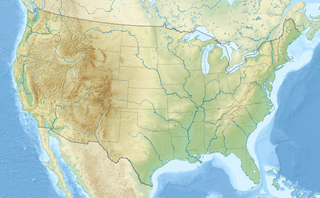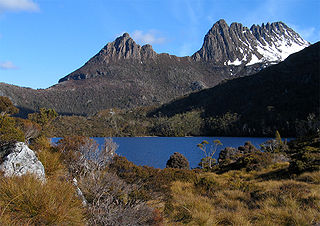
The Tasmanian Wilderness World Heritage Area is a World Heritage Site in Tasmania, Australia.

Forest Park is a public municipal park in the Tualatin Mountains west of downtown Portland, Oregon, United States. Stretching for more than 8 miles (13 km) on hillsides overlooking the Willamette River, it is one of the country's largest urban forest reserves. The park, a major component of a regional system of parks and trails, covers more than 5,100 acres (2,064 ha) of mostly second-growth forest with a few patches of old growth. About 70 miles (110 km) of recreational trails, including the Wildwood Trail segment of the city's 40-Mile Loop system, crisscross the park.
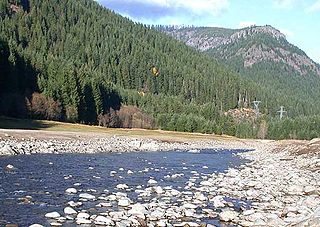
The Willamette National Forest is a National Forest located in the central portion of the Cascade Range of the U.S. state of Oregon. It comprises 1,678,031 acres (6,790.75 km2), making it one of the largest national forests. Over 380,000 acres are designated wilderness which include seven major mountain peaks. There are also several National Wild and Scenic Rivers within the forest. The forest is named for the Willamette River, which has its headwaters in the forest. The forest headquarters are located in the city of Springfield. There are local ranger district offices in McKenzie Bridge, Detroit, Sweet Home, and Westfir.

Environmentalism or environmental rights is a broad philosophy, ideology, and social movement regarding concerns for environmental protection and improvement of the health of the environment, particularly as the measure for this health seeks to incorporate the impact of changes to the environment on humans, animals, plants and non-living matter. While environmentalism focuses more on the environmental and nature-related aspects of green ideology and politics, ecology combines the ideology of social ecology and environmentalism. Ecology is more commonly used in continental European languages while ‘environmentalism’ is more commonly used in English but the words have slightly different connotations.
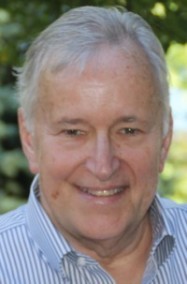
Walter Leslie "Les" AuCoin, is an American politician and the first from the Democratic Party to be elected to the U.S. House of Representatives from Oregon's 1st congressional district, since it was formed in 1882. The seat has been held by Democrats ever since.
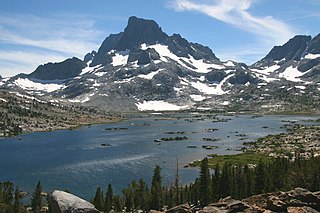
The National Wilderness Preservation System (NWPS) of the United States protects federally managed wilderness areas designated for preservation in their natural condition. Activity on formally designated wilderness areas is coordinated by the National Wilderness Preservation System. Wilderness areas are managed by four federal land management agencies: the National Park Service, the U.S. Forest Service, the U.S. Fish and Wildlife Service, and the Bureau of Land Management. The term "wilderness" is defined as "an area where the earth and community of life are untrammeled by man, where man himself is a visitor who does not remain" and "an area of undeveloped Federal land retaining its primeval character and influence, without permanent improvements or human habitation, which is protected and managed so as to preserve its natural conditions." As of 2016, there are 765 designated wilderness areas, totaling 109,129,657 acres (44,163,205 ha), or about 4.5% of the area of the United States.
The Western Canada Wilderness Committee is a non-profit environmental education organization that aims to protect Canada's wild spaces and species. Paul George, along with Richard Krieger, were the founding directors, and formed the Wilderness Committee in the province of British Columbia in 1980. It now has a membership of over 30,000 people with its head office in Vancouver and field offices in Victoria, British Columbia; Winnipeg, Manitoba; and Toronto, Ontario.
Oregon Ballot Measure 37 is a controversial land-use ballot initiative that passed in the U.S. state of Oregon in 2004 and is now codified as Oregon Revised Statutes (ORS) 195.305. Measure 37 has figured prominently in debates about the rights of property owners versus the public's right to enforce environmental and other land use regulations. Voters passed Measure 49 in 2007, substantially reducing the impact of Measure 37.

The Opal Creek Wilderness is a wilderness area located in the Willamette National Forest in the U.S. state of Oregon, on the border of the Mount Hood National Forest. It has the largest uncut watershed in Oregon.

The Pacific Green Party of Oregon (PGP) is a political party in the U.S. state of Oregon. It is a member of the Green Party of the United States.
The Fund for the Public Interest is a 501(c)(4) non-profit organization that runs the public fundraising and canvassing operations for politically liberal nonprofit organizations in the United States. The Fund is the largest fundraiser for progressive causes in the United States. FFPIR was set up in 1982 as the fundraising arm of the Public Interest Research Group (PIRGs), which was founded by Ralph Nader. The Fund has been involved in several lawsuits regarding unfair labor practices, including failing to pay workers minimum wage.

Environment California is a 501(c)(4) nonprofit political organization that lobbies for environmental legislation in the U.S. state of California. It is affiliated with Environment America and the Fund for the Public Interest.

Tobias Read is an American Democratic politician who is the current Oregon State Treasurer. He was a member of the Oregon House of Representatives, representing District 27 from 2007–2017, which comprises parts of Beaverton, southwest Portland, and unincorporated Multnomah and Washington Counties. He served as Speaker Pro Tempore, and was formerly the Democratic Majority Whip.
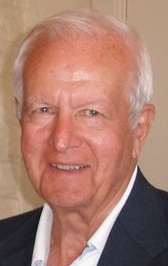
Harold K. Lonsdale was an American scientist, businessman, and former politician. A Democrat, he ran for United States Senate in the U.S. state of Oregon three times, losing twice in the primaries and once as the Democratic candidate, losing in the 1990 general election to incumbent Mark Hatfield. In 2011 Lonsdale sponsored a research challenge to determine the origin of life on Earth.
BARK is an Oregon, United States, non-profit organization that was created to combat logging, clear-cutting, deforestation and projects members say cause "commercial destruction" in Oregon forests, specifically those of the Mt. Hood National Forest.
Oregon Wild, formerly the Oregon Natural Resources Council, is an American conservation organization based in Portland, Oregon, with offices in Eugene and Bend. The group is notable for having had a case, Marsh v. Oregon Natural Resources Council 490 U.S. 360 (1989), tried before the U.S. Supreme Court.
The Southeast Alaska Conservation Council (SEACC) is a non-profit organization that focusses on protecting the lands and waters of Southeast Alaska. They promote conservation and advocate for sustainable natural resource management. SEACC is located in Alaska’s capital: Juneau. The environmental organization focuses specifically on concerns in the Southeast region of Alaska: including the Panhandle, the Tongass National Forest and the Inside Passage.

The March for Science Portland was a protest held in Portland, Oregon. This local protest was part of the March for Science, a series of rallies and marches in Washington, D.C. and over 600 cities across the world on April 22, 2017. Portland Science Advocates organized the march in support of science and to protest President Donald Trump's plan to cut funding for the Environmental Protection Agency and the National Institutes of Health. Funding for the event, which cost approximately $30,000, was crowdsourced.







